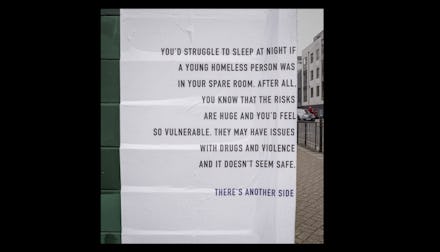This Inspiring Ad Campaign Wants People to See “Another Side” of Youth Homelessness

A homeless person asking for money on the street is not a unique sight in major cities, but is it "really your problem?"
According to Depaul U.K., it is. The London nonprofit, which provides emergency evening beds for young people ages 16 to 25 from a network of accredited volunteers, is spreading the word that homelessness can be addressed by asking people to consider opening doors to the homeless instead of shutting them out.
Londoners who can take in homeless youth may avoid doing so because of stereotypes or personal safety concerns. So Depaul teamed up with ad agency Publicis London to create street-corner posters challenging misguided assumptions about homeless individuals.
One side of each poster details the excuses preventing people from temporarily housing homeless youth. The words on the other side of the corner expands the context of the statement, using language that a person would use if he or she decided to help someone out for a night.
An important message: Although people experiencing homelessness endure intense daily struggles, including violence and depression, they need support and compassion. This is often hard to find, because society often renders homeless people as invisible. That's where Depaul's core of "nightstop" volunteers come in.
"Nightstop volunteers are ordinary people helping those with nowhere to stay the night," said Martin Houghton-Brown, chief executive of Depaul U.K., in a press release. "More young people than ever are sleeping in unsafe places, and we have seen demand for our emergency accommodation services soar over 300% in London last year. We need more volunteers to come forward so we don't turn people away."
This campaign matters: In the U.K., and U.S., the hundreds of thousands of people who are homeless face heightened stigma and criminalization. As Mic reported last June, a luxury apartment complex in London prompted outrage from human rights organizations after planting spikes in front of the building to keep homeless people from sleeping near entrances and on corners. In September, Fort Lauderdale, Florida, passed a law handing anyone sleeping publicly downtown or panhandling at busy traffic intersections a $500 fine and 60 days in jail. Two months later, the city also restricted organizations from feeding homeless people in certain areas.
Policies like these only block homeless people from receiving the help they need, while feeding into the stigma. From the halls of government to everyday people walking down the street, apathy needs to give way to empathy, and soon — especially when there are clear opportunities to make positive change and move towards lasting solutions.
The gesture could be a simple as opening up an extra bed.